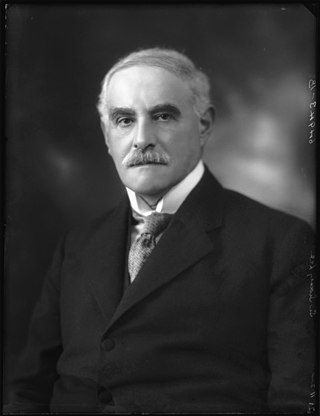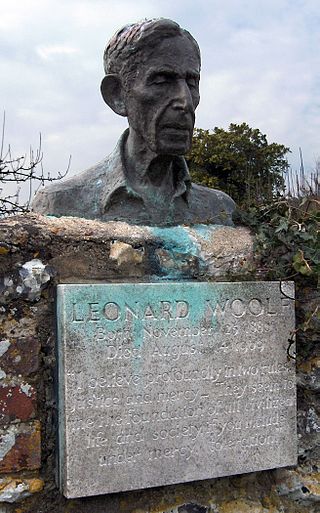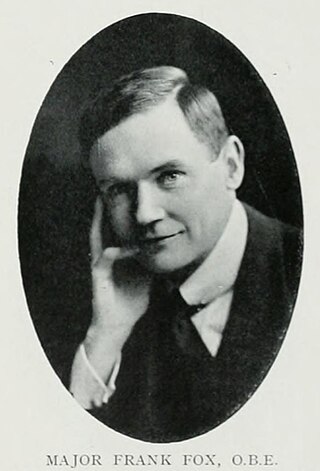Related Research Articles

This section of the timeline of United States history concern events from 1900 to 1929.

Sir Sidney Lee was an English biographer, writer, and critic.

Leonard Sidney Woolf was a British political theorist, author, publisher, and civil servant. He was married to author Virginia Woolf. As a member of the Labour Party and the Fabian Society, Woolf was an avid publisher of his own work and his wife's novels. A writer himself, Woolf created nineteen individual works and wrote six autobiographies. Leonard and Virginia did not have any children.
This is a complete list of works by H. P. Lovecraft. Dates for the fiction, collaborations and juvenilia are in the format: composition date / first publication date, taken from An H. P. Lovecraft Encyclopedia by S. T. Joshi and D. E. Schultz, Hippocampus Press, New York, 2001. For other sections, dates are the time of composition, not publication. Many of these works can be found on Wikisource.

Edward Verrall Lucas, CH was an English humorist, essayist, playwright, biographer, publisher, poet, novelist, short story writer and editor.

Edwin Robert Anderson Seligman (1861–1939), was an American economist who spent his entire academic career at Columbia University in New York City. Seligman is best remembered for his pioneering work involving taxation and public finance. His principles for a progressive federal income tax were adopted by Congress after the passage of the Sixteenth Amendment. A prolific scholar and teacher, his students had great influence on the fiscal architecture of postcolonial nations. He served as an influential founding member of the American Economics Association.
This is a list of the books written by G. K. Chesterton.
The New International Encyclopedia was an American encyclopedia first published in 1902 by Dodd, Mead & Co.. It descended from the International Cyclopaedia (1884) and was updated in 1906, 1914 and 1926.

Jeremiah Denis Mathias Ford (1873–1958) was an American educator and author. He was the Smith Professor Emeritus of the French and Spanish Languages and Literature at Harvard University from 1907 to 1943. He was the youngest-ever to be appointed a professor at Harvard, the first Catholic faculty, and the last ever appointed as Chairman of the Department of Romance Languages from 1911 to 1943.
Sir Richard Olaf Winstedt, or more commonly R. O. Winstedt, was an English Orientalist and colonial administrator with expertise in British Malaya.

The Lincoln Library of Essential Information was originally published as a one-volume general-reference work, in 1924. In later years, it was published in two- and three-volume editions, and the title was changed.
The Encyclopædia Edinensis was a six-volume general encyclopedia published in Edinburgh in 1827, and intended for a popular audience. It was edited by James Millar, who died just before it was complete.

Sir Frank Ignatius Fox was an Australian-born journalist, soldier, author and campaigner, who lived in Britain from 1909.
The New Century Book of Facts was a single volume general reference work published in the United States from 1909 to 1964.
The Teacher's and Pupil's Cyclopaedia was the original name of an encyclopedia set that was published in the United States in different forms for nearly 60 years.
The Volume Library was a one volume general encyclopedic reference work that was published from 1911 to 1985. It remained as a two or three volume reference work until at least 2004.

Alice Isabel Hazeltine was an American librarian, writer, and editor. She was on the faculty of the School of Library Service at Columbia University, and edited several collections of stories for children and teenagers, published in multiple editions through the twentieth century.
References
- ↑ S. Padraig Walsh Anglo-American General Encyclopedias 1704-1967 New York: R. R. Baker and Company, 1968 p.157
- ↑ Walsh pp.157, The standard dictionary of facts; history, language, literature, biography, geography, travel, art, government, politics, industry, invention, commerce, science, education, natural history, statistics and miscellany Buffalo, N.Y., The Frontier press company 1911, 1916, 1917 and 1919 editions, title pages
- ↑ The standard dictionary of facts; history, language, literature, biography, geography, travel, art, government, politics, industry, invention, commerce, science, education, natural history, statistics and miscellany Buffalo, N.Y., The Frontier press company 1911 inside cover flap